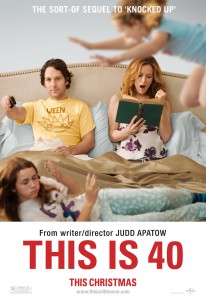 Writer-director Judd Apatow has made the mistake of believing that the audience will find his wife and children and mid-life crisis as relatable and endearing as he does. And there is nothing more fatal to a movie than a gross miscalculation about the appeal of its characters. It’s fine to make a movie about unpleasant people as long as the movie knows they are unpleasant. But this movie asks us to care about the concerns of people who care very little for anything but the most superficial and selfish problems, with no sense at all of how shallow and unappealing they are.
Writer-director Judd Apatow has made the mistake of believing that the audience will find his wife and children and mid-life crisis as relatable and endearing as he does. And there is nothing more fatal to a movie than a gross miscalculation about the appeal of its characters. It’s fine to make a movie about unpleasant people as long as the movie knows they are unpleasant. But this movie asks us to care about the concerns of people who care very little for anything but the most superficial and selfish problems, with no sense at all of how shallow and unappealing they are.
Apatow’s mega-successful “Knocked Up” was the story of a successful professional woman who became pregnant after a one-night stand with a man who was neither successful nor professional. The pregnant woman’s sister Debbie (Apatow’s real-life spouse Leslie Mann) and her husband Pete (Paul Rudd) provided a comedic counterpoint, coping with marital stress, including two children, played by Apatow and Mann’s real-life children. In one scene, Debbie and her sister are not permitted into a club because Debbie is too old and her sister is pregnant. Debbie is devastated by the loss of this important validation. Debbie is shrill and demanding, constantly blaming her husband. In one big plot twist, it turns out that the secret he had been hiding from her was not an affair but a fantasy sports group he liked to escape to.
“This is 40” continues the story of Pete and Debbie. She is still shrill and demanding, still constantly blaming her husband, and still pretty much on board with the idea that her self-worth depends on being attractive to strangers in hot clubs. In the opening scene, the week of both Pete’s and Debbie’s 40th birthdays, they are having very enthusiastic sex in the shower when he reveals that his performance has been enhanced with medication. Instead of expressing concern or sympathy or support, she interprets this as evidence that she is no longer as attractive as she was when she was younger. She whines to her personal trainer (Apatow regular Jason Segal) that she is failing to arouse men and he consoles her by saying that she arouses him.
Debbie insists that she and Pete embark on a course of self-improvement that involves graphic depictions of a mammogram and a colonoscopy, and a lot of resolutions about eating better and unplugging the kids from the internet. It does not, however, involve any expressions of generosity, humility, compassion, responsibility, or maturity. Pete and Debbie are aggrieved by the remoteness (her) and dependence (his) of their fathers, but they are not doing much better as parents. I have a sinking feeling that there will a a future sequel for the girls to work out their issues with their parents.
The movie is overlong and saggy, swooping almost randomly from set-piece scene to set-piece scene, and yet it is all supposed to take place in about one week. This continually undercuts any sense of forward momentum and Apatow stuffs his films with so many of his friends that we keep having to be reminded of who all the characters are. And then when we are reminded, we are disappointed all over again. Segal, Chris O’Dowd (“Bridesmaids”), Lena Dunham (“Girls”), Charlene Yi and Melissa McCarthy (“Bridesmaids”) are all trotted out for short bits and some are quite funny (be sure to stay for McCarthy’s outtakes during the credits). And Megan Fox is a standout as an impossibly hot and possibly larcenous employee in Debbie’s boutique. This is Fox’s second top-notch performance this year, following “Friends With Kids” — take that, Michael Bay. There is even an occasional flash of understanding of the challenges of marriage and getting older, as when Pete and Debbie try (but not very hard) to use obviously therapy-inspired tactics for expressing their complaints and disappointments.
But that is not enough to make up for the inert plotline and unappealing characters. For a guy who seems to think about nothing more than the travails of self-absorbed people suffering from arrested development, Apatow has failed to learn that the issue is not growing old — it is growing up.
Parents should know that this film includes extremely graphic and explicit sexual references and situations including fertility issues and an “escort,” constant very strong language, drinking, marijuana, some mild violence (no one badly hurt), family stress, and stealing.
Family discussion: What do we learn about Pete and Debbie from their relationships with their fathers? Why was staying young so important to Debbie?
If you like this, try: “Knocked Up” (featuring the same characters) and “The 40 Year Old Virgin”
, revisit the book and take a look at four earlier versions:
Alan Ladd and Betty Field star in the earliest surviving version of the story, heavy-handed and missing the lyricism of the book. (A 1926 film with Warner Baxter has been lost.)
Robert Redford and Mia Farrow star in this sumptuous version that is rather static but better than its reputation.
A TV version starred Mira Sorvino, Paul Rudd, and Toby Stephens and preserves more of the narration from the novel.
 G.
G. Audacious, ambitious, and provocative but uneven and ultimately unsatisfying, this film adapts and updates the story. Instead of Jay Gatsby, the Prohibition-era gangster who can’t forget the girl he lost, we have Summer G, the gangsta, the head of a successful hip-hop recording label.
A tragic love set story in post-WWI Germany starring Robert Young and Margaret Sullavan.
Gregory Peck plays Fitzgerald in this movie based on the memoir of gossip columnist Sheilah Graham about their years together.
Tom Hiddleston and Alison Pill play Scott and Zelda Fitzgerald in Woody Allen’s romantic comedy about a contemporary writer who goes back in time to meet his literary heroes.
Malcolm Gets plays Fitzgerald in this movie about the New York writers who gathered at the Algonquin hotel for cocktails and repartee.




